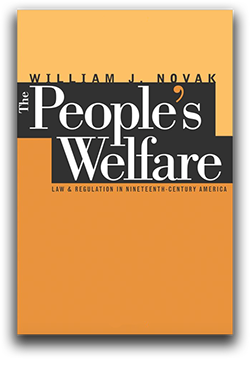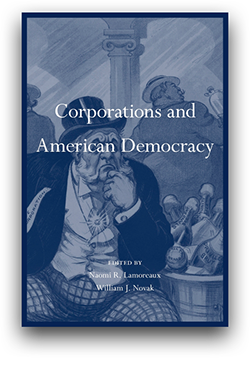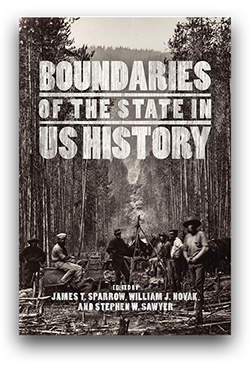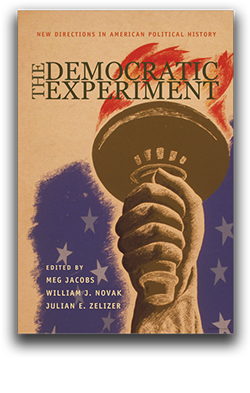
Corporations and American Democracy
Recent U.S. Supreme Court decisions in Citizens United and other high-profile cases have sparked passionate disagreement about the proper role of corporations in American democracy. Partisans on both sides have made bold claims, often with little basis in historical facts. Bringing together leading scholars of history, law, and political science, Corporations and American Democracy provides the historical and intellectual grounding necessary to put today’s corporate policy debates in proper context.
From the nation’s founding to the present, Americans have regarded corporations with ambivalence—embracing their potential to revolutionize economic life and yet remaining wary of their capacity to undermine democratic institutions. Although corporations were originally created to give businesses and other associations special legal rights and privileges, historically they were denied many of the constitutional protections afforded flesh-and-blood citizens.
This comprehensive volume covers a range of topics, including the origins of corporations in English and American law, the historical shift from special charters to general incorporation, the increased variety of corporations that this shift made possible, and the roots of modern corporate regulation in the Progressive Era and New Deal. It also covers the evolution of judicial views of corporate rights, particularly since corporations have become the form of choice for an increasing variety of nonbusiness organizations, including political advocacy groups. Ironically, in today’s global economy the decline of large, vertically integrated corporations—the type of corporation that past reform movements fought so hard to regulate—poses some of the newest challenges to effective government oversight of the economy.
Boundaries of the State in US History
The question of how the American state defines its power has become central to a range of historical topics, from the founding of the Republic and the role of the educational system to the functions of agencies and America’s place in the world. Yet conventional histories of the state have not reckoned adequately with the roots of an ever-expanding governmental power, assuming instead that the American state was historically and exceptionally weak relative to its European peers.
Here, James T. Sparrow, William J. Novak, and Stephen W. Sawyer assemble definitional essays that search for explanations to account for the extraordinary growth of US power without resorting to exceptionalist narratives. Turning away from abstract, metaphysical questions about what the state is, or schematic models of how it must work, these essays focus instead on the more pragmatic, historical question of what it does. By historicizing the construction of the boundaries dividing America and the world, civil society and the state, they are able to explain the dynamism and flexibility of a government whose powers appear so natural as to be given, invisible, inevitable, and exceptional.
The Democratic Experiment
In a series of fascinating essays that explore topics in American politics from the nation's founding to the present day , The Democratic Experiment opens up exciting new avenues for historical research while offering bold claims about the tensions that have animated American public life. Revealing the fierce struggles that have taken place over the role of the federal government and the character of representative democracy, the authors trace the contested and dynamic evolution of the national polity.
The contributors, who represent the leading new voices in the revitalized field of American political history, offer original interpretations of the nation's political past by blending methodological insights from the new institutionalism in the social sciences and studies of political culture. They tackle topics as wide-ranging as the role of personal character of political elites in the Early Republic, to the importance of courts in building a modern regulatory state, to the centrality of local political institutions in the late twentieth century. Placing these essays side by side encourages the asking of new questions about the forces that have shaped American politics over time. An unparalleled example of the new political history in action, this book will be vastly influential in the field.
In addition to the editors, the contributors are Brian Balogh, Sven Beckert, Rebecca Edwards, Joanne B. Freeman, Richard R. John, Ira Katznelson, James T. Kloppenberg, Matthew D. Lassiter, Thomas J. Sugrue, Michael Vorenberg, and Michael Willrich.

The People's Welfare
Much of today's political rhetoric decries the welfare state and our maze of government regulations. Critics hark back to a time before the state intervened so directly in citizens' lives. In The People's Welfare, William Novak refutes this vision of a stateless past by documenting America's long history of government regulation in the areas of public safety, political economy, public property, morality, and public health. Challenging the myth of American individualism, Novak recovers a distinctive nineteenth-century commitment to shared obligations and public duties in a well-regulated society. Novak explores the by-laws, ordinances, statutes, and common law restrictions that regulated almost every aspect of America's society and economy, including fire regulations, inspection and licensing rules, fair marketplace laws, the moral policing of prostitution and drunkenness, and health and sanitary codes. Based on a reading of more than one thousand court cases in addition to the leading legal and political texts of the nineteenth century, The People's Welfare demonstrates the deep roots of regulation in America and offers a startling reinterpretation of the history of American governance.
© 2019 by William J. Novak


